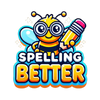
- Amal Augustine
- January 24, 2025
Build Your Word Bank: 25 Must-Know Words to Supercharge Your Communication
Amal Augustine is the founder of Spelling Better, a cutting-edge educational app built to help students, spelling bee participants, and language learners improve their vocabulary, spelling accuracy, and word recall through interactive games, pangram challenges, and real-time quizzes.
He holds a Bachelor’s degree in Computer Science from St. Stephen’s College, University of Delhi. He is currently pursuing his Master’s in Information Security at National Sun Yat-sen University, Taiwan.
- Today’s NYT Spelling Bee Pangram and Word List – June 11, 2025 - June 12, 2025
- Today’s NYT Spelling Bee Pangram & Word List – Full Breakdown - May 3, 2025
- NYT Spelling Bee Answers for Today’s Pangram Solutions - May 2, 2025
Every person has a unique word bank—a collection of words they frequently use to communicate. Your word bank can include academic terms, professional jargon, or even casual expressions, depending on the context. By diversifying and enriching it, you not only improve your communication but also make your thoughts flow more naturally.
In this blog, we’re sharing a list of impactful words that you can add to your word bank this week. Each word comes with its meaning, usage tips, and examples to help you get started. Let’s dive in!
Think of these as your academic superpowers. They help you sound smart, professional, and precise when tackling essays, research papers, or exams.
Analyze
Meaning: To break something down into smaller parts to understand its structure or meaning.
When to use: Use this word when explaining the reasons behind an event, process, or problem.
Example: The teacher asked us to analyze the causes of World War II in our history paper.
Try This: Analyze your favorite TV show’s plot and explain why it’s so engaging.
Synthesize
Meaning: To combine different ideas into one complete thought or conclusion.
When to use: Use it in essays where you need to bring together multiple sources of information.
Example: In her science project, she synthesized data from several experiments to create her hypothesis.
Fun Challenge: Combine two unrelated topics (like “video games” and “climate change”) into one idea!
Evaluate
Meaning: To judge or assess the value, quality, or effectiveness of something.
When to use: Use this word when weighing pros and cons or discussing the impact of something.
Example: We were asked to evaluate the effectiveness of recycling programs in reducing waste.
Interactive Activity: Evaluate your favorite movie. What worked? What didn’t? Rate it out of 10.
Articulate
Meaning: To express thoughts clearly and effectively.
When to use: Use it when discussing someone’s ability to communicate ideas.
Example: She articulated her opinion about the book so well that everyone agreed with her.
Pro Tip: Practice articulating your thoughts by explaining a complicated topic (like math!) to a friend.
Coherent
Meaning: Logical and well-organized; everything makes sense together.
When to use: Use it to describe essays, arguments, or presentations that are easy to follow.
Example: My teacher said my essay was coherent because all my points were connected.
Quick Practice: Write a short paragraph on a topic you like. Check if all your points fit together logically.
Pragmatic
Meaning: Focused on practical and realistic solutions.
When to use: Use it when talking about solving problems effectively.
Example: Instead of cramming, I made a pragmatic study plan to focus on my weak subjects.
Reflection: Think about your study habits. Are they pragmatic or do you need a more realistic approach?
Credible
Meaning: Trustworthy and believable.
When to use: Use it when discussing reliable sources or factual information.
Example: Wikipedia isn’t always considered a credible source for research papers.
Interactive Idea: Compare two websites on the same topic. Which one feels more credible and why?
Empirical
Meaning: Based on real evidence or observations rather than theory.
When to use: Use it in science experiments or research essays.
Example: Her argument was strong because it was supported by empirical data.
Pro Tip: When researching, look for empirical studies that back up your ideas.
Innovate
Meaning: To create something new or improve existing ideas.
When to use: Use it when discussing inventions, creativity, or progress.
Example: The team innovated a new app to help students organize their homework.
Creative Challenge: Think of one small problem you face every day. How would you innovate a solution for it?
Equivocal
Meaning: Unclear or open to multiple interpretations.
When to use: Use it when describing vague statements or unclear instructions.
Example: The politician’s answer was so equivocal that no one understood his stance.
Fun Game: Write an equivocal sentence (something vague) and see how your friends interpret it!
Meticulous
Meaning: Extremely careful and precise, with great attention to detail.
When to use: Use this to describe someone’s work or habits, especially when they are thorough or organized.
Example: The artist was meticulous in painting every detail of the portrait.
Pro Tip: Pay attention to small details in your projects or assignments, and someone might describe you as meticulous!
Creative Challenge: Think of a time when you were meticulous—maybe organizing your notes or preparing for an exam. Write a short description of that moment.
Lethargic
Meaning: Feeling tired or lacking energy.
When to use: Use this word to describe someone’s mood after a long day or hard work.
Example: After staying up all night, I felt too lethargic to focus in class.
Pro Tip: If you ever feel lethargic, a quick walk or short burst of exercise can help re-energize you!
Fun Task: Write a humorous sentence using “lethargic,” like, “I was so lethargic after binge-watching Netflix that even my cat judged me.”
Astute
Meaning: Sharp and clever, with the ability to notice and understand things that others might miss.
When to use: Use this word to describe someone who’s quick to figure things out or make smart decisions.
Example: Her astute observations helped the team solve the problem faster.
Pro Tip: If you spot a solution no one else sees in a group project, you’re being astute!
Interactive Challenge: Think of an astute observation you’ve made recently—maybe you noticed a shortcut in a game or solved a tricky puzzle. Write about it in one sentence.
Ephemeral
Meaning: Lasting for a short time, fleeting.
When to use: Use this to describe moments or things that are temporary but meaningful.
Example: The joy of winning the prize was ephemeral but unforgettable.
Pro Tip: Use “ephemeral” in creative writing to describe sunsets, emotions, or memories. It makes your descriptions poetic and meaningful.
Creative Challenge: Write a sentence about an ephemeral moment you’ve experienced, like a beautiful sunrise or the laughter of friends during a fun day.
Impeccable
Meaning: Perfect and flawless, with no mistakes.
When to use: Use this word to describe behavior, performances, or even someone’s outfit.
Example: Her impeccable handwriting impressed the teacher.
Pro Tip: Use “impeccable” as a compliment for something truly impressive—it makes the praise feel extra special.
Fun Task: Write a compliment for your favorite teacher or friend using “impeccable.” For example: “Your style is always impeccable!”
Tenacious
Meaning: Determined and persistent, never giving up easily.
When to use: Use this word to describe someone who works hard and stays focused on their goals.
Example: Her tenacious attitude helped her complete the marathon.
Pro Tip: Whenever you feel like giving up, remind yourself that being tenacious is what gets results.
Interactive Activity: Think of someone you know (or yourself!) who is tenacious. Write a quick note about their determination and what makes them inspiring.
Scrutinize
Meaning: To examine something very closely and critically.
When to use: Use this word to describe detailed reviews, whether it’s analyzing data, assignments, or even a recipe.
Example: The editor scrutinized every detail of the manuscript.
Pro Tip: Scrutinizing your own work—like double-checking an essay—can save you from small mistakes!
Creative Challenge: Look at an object near you (like your phone or a pen) and scrutinize it. Write three tiny details you notice about it that others might miss.
Vivid
Meaning: Producing clear and strong images or ideas in your mind.
When to use: Use it to describe descriptions or memories that feel alive and colorful.
Example: The author’s vivid descriptions brought the story to life.
Pro Tip: When writing vivid descriptions, think about sensory details—what can you see, hear, smell, or feel?
Fun Task: Write a vivid description of your favorite meal. Use words that make your reader feel like they’re tasting it too!
Quirky
Meaning: Unique or unusual in an interesting or fun way.
When to use: Use this word to describe personalities, habits, or designs that stand out because they’re different.
Example: His quirky sense of humor made him the life of the party.
Pro Tip: “Quirky” is a fun way to compliment someone for their individuality—it shows you appreciate their uniqueness.
Creative Challenge: Think of one quirky thing about yourself and write it down. For example: “I always color-code my notebooks, even for fun projects!”
Haphazard
Meaning: Lacking organization or order, done randomly.
When to use: Use this to describe something messy, unplanned, or chaotic.
Example: The haphazard arrangement of files made it difficult to find anything.
Pro Tip: If you ever hear someone call your work haphazard, take a moment to organize—it’ll help you shine!
Interactive Idea: Find a messy space around you (your desk, maybe?) and describe it using “haphazard.” Then, organize it and describe it again!
Conclusion
Descriptive words add color and detail to your communication, making your writing and speech stand out. Whether you’re describing a scene in a story or giving feedback, these words help you convey your thoughts with precision and flair.
What’s Next?
Pick 3 words from each category and try to use them in your assignments or daily conversations this week. What’s the one word from this list you’ve connected with the most? Share it in the comments!
Amal Augustine is the founder of Spelling Better, a cutting-edge educational app built to help students, spelling bee participants, and language learners improve their vocabulary, spelling accuracy, and word recall through interactive games, pangram challenges, and real-time quizzes.
He holds a Bachelor’s degree in Computer Science from St. Stephen’s College, University of Delhi. He is currently pursuing his Master’s in Information Security at National Sun Yat-sen University, Taiwan.

